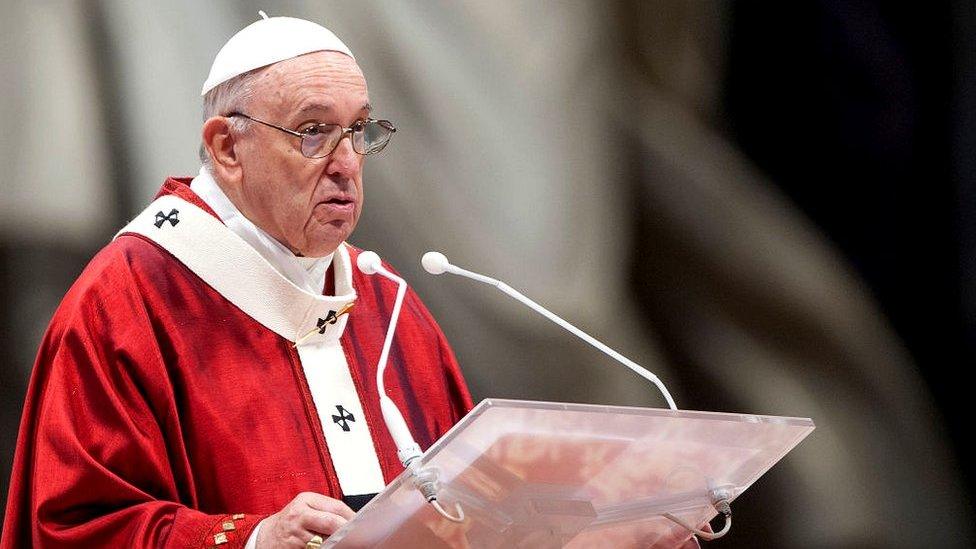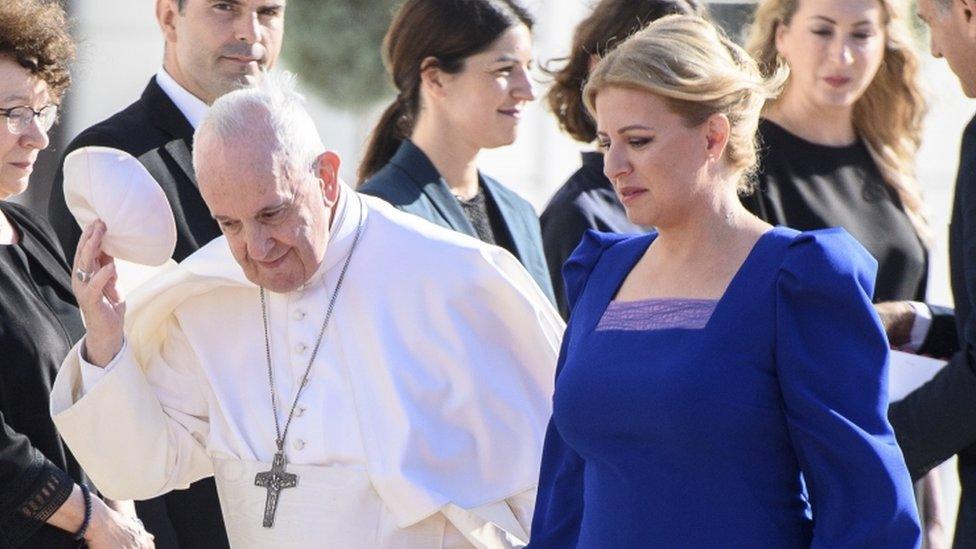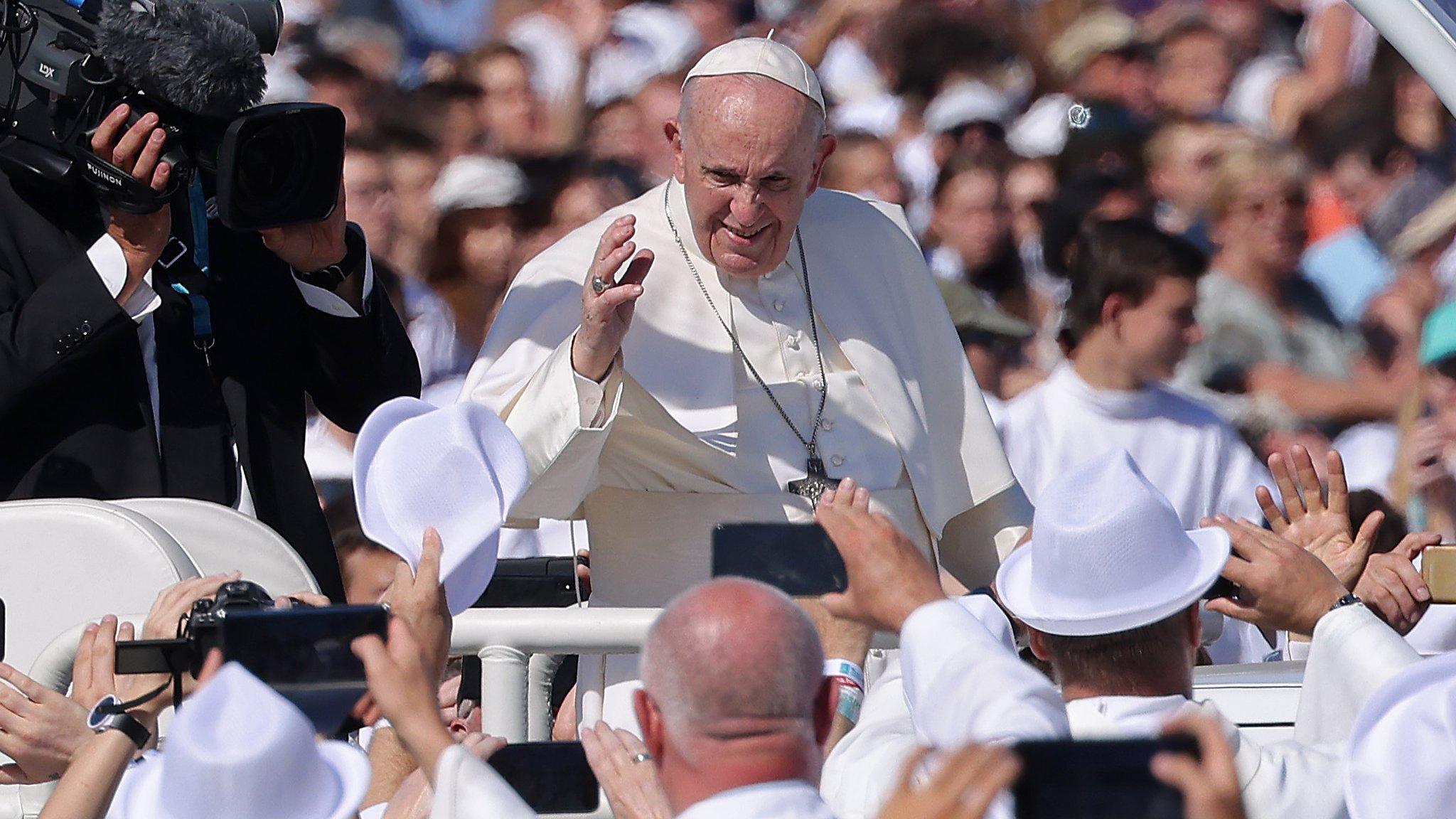Pope urges 'radical' climate response in exclusive BBC message
- Published
Pope Francis delivered his message for BBC Radio 4's Thought for the Day
In a message recorded exclusively for the BBC, Pope Francis has called on world leaders meeting next week at the UN Climate conference in Glasgow to provide "effective responses" to the environment emergency and offer "concrete hope" to future generations.
Speaking from the Vatican for BBC Radio 4's Thought for the Day, the Pope talked of crises including the Covid-19 pandemic, climate change and economic difficulties, and urged the world to respond to them with vision and radical decisions, so as not to "waste opportunities" that the current challenges present.
"We can confront these crises by retreating into isolationism, protectionism and exploitation," the pontiff said, "or we can see in them a real chance for change."
He evoked the need for "a renewed sense of shared responsibility for our world", adding that "each of us - whoever and wherever we may be - can play our own part in changing our collective response to the unprecedented threat of climate change and the degradation of our common home."
The Pontiff is due to meet US President Joe Biden at the Vatican later. Mr Biden's domestic climate policies are yet to pass through the US Congress.
The message is a reminder of the emphasis Francis has placed on environmentalism throughout his pontificate.
He has frequently evoked the climate crisis in speeches, and in 2015 published an encyclical, or papal document, called Laudato Si' focusing on the issue. In the text, subtitled On Care for our Common Home, he decried environmental destruction, stressed the need to take mitigating measures and gave an unambiguous acceptance that climate change was largely manmade.
The letter was issued before the 2015 UN climate conference in Paris, COP21, and was seen as having some impact on pushing leaders towards an agreement.
It was evoked during discussions, including by the president of Paraguay, who spoke of the Pope's "dramatic warning that we face a crisis and need to protect the world upon which we rely for life".
Six years on, world leaders are preparing to gather in Glasgow for this year's climate summit, COP26.
With growing evidence that the commitments made in Paris to keep global temperature rises "preferably to 1.5 degrees Celsius, compared to pre-industrial levels" aren't being met, Pope Francis has again focused on the issue, hoping his intervention will have a similar impact.

COP26 climate summit - The basics
Climate change is one of the world's most pressing problems. Governments must promise more ambitious cuts in warming gases if we are to prevent greater global temperature rises.
The summit in Glasgow is where change could happen. You need to watch for the promises made by the world's biggest polluters, like the US and China, and whether poorer countries are getting the support they need.
All our lives will change. Decisions made here could impact our jobs, how we heat our homes, what we eat and how we travel.

Earlier this month, he gathered almost 40 faith leaders from across the world at the Vatican to sign a joint appeal calling on COP26 to stick to pledges on global warming, carbon neutrality and support for poorer nations to transition to clean energy. In return, the leaders committed to educating and informing their faithful about the climate emergency.
There was an expectation that the Pope would attend the conference in Glasgow, telling journalists over the summer that his speech was being written. But at the last minute the Vatican announced that the 84-year-old pontiff would not be going, giving no reason.
That is a blow for COP26's organisers, who had hoped his presence would lend added weight to a summit dubbed "the world's best last chance to get runaway climate change under control".
And so this message through the BBC is intended to give his guidance from afar.
"Every crisis calls for vision… to rethink the future of the world," he said, urging "radical decisions" and "a renewed sense of shared responsibility for our world".
"The most important lesson we can take from these crises is our need to build together, so that there will no longer be any borders, barriers or political walls for us to hide behind."


Related topics
- Published8 October 2021

- Published13 September 2021

- Published12 September 2021
